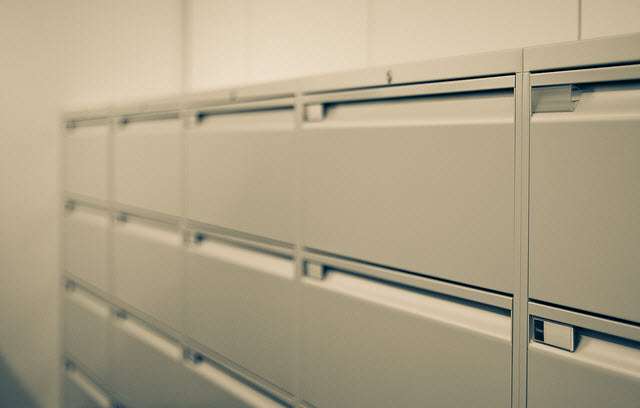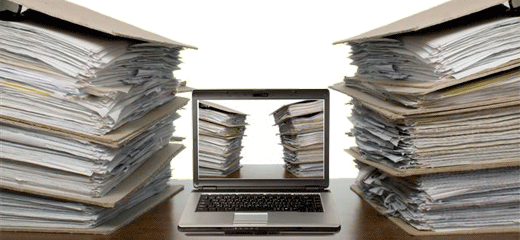In today’s modern world, technology is constantly on the rise and almost everything is being digitized. Take paper, for example. If you think about it, just a decade ago we were still using it to store information relevant to our everyday work. We were writing down everything from notes and phone numbers to memos and contracts — you name it.
The digital evolution is great at changing the way we now use these documents. It’s as simple as sending an email, downloading files and saving a phone number on your smartphone. The lack of paper mountains at our workstations definitely implies that productivity has increased and our work life is much more streamlined.
However, if you think that paper is completely gone, think again. Some workplaces and individuals are still resistant. There are different areas that heavily rely on paper documents such as legal departments, HR, administration, as they still print out contracts, permits, and receipts. We’re still on a bumpy road to a completely paperless existence, and this is a good thing.
There will always be pros and cons for using paper. So today we’re taking a look at a few concrete ways the paperless goal is changing our lives in hopes that this can help you answer the question of why you should or shouldn’t go fully paperless.
Why You Should Go Paperless
1. Save Time –A Significant Amount of Time
Time is money and you don’t want to waste money. So whenever you have the opportunity to save time, you shouldn’t hesitate. New applications, forms, requests or memos are easier to handle, navigate and quicker to process.
And since all your documents are stored in cloud databases rather in physical files it becomes efficient since people don’t have to manually search for each piece of data they need. Now imagine if this extended to areas where processing documents is extensively time consuming, like when you’re traveling. This idea of a paperless passport has been played around with before and has even been taken to the first level of development.
A good example comes from Dubai, whose government is aiming to make all government services and transactions paperless by 2021. They’ve introduced a new app, Smart UAE Wallet, which allows a person to use his smartphone as a digital passport. This immeasurably saves time since that person only needs to enter personal details inside the app and provide a fingerprint for security and identity reasons. Dubai is the first to introduce a working concept of the paperless passport and we hope this trend will continue for faster checkins and processing at airports worldwide.
2. Everything Becomes More Accessible
Going paperless is not only visually appealing for your office, but it’s also more practical. Companies are constantly saving a huge amount of information and if this data is stored in paper form, getting that one document you need can be an enormous challenge — no matter how efficient you are. One of the benefits of going paperless is the advantage of finding and accessing data instantly.
Take, for example, New York. It is currently the only state that has prohibited the practice of paperless ticketing. Tickets cannot be printed at home or received by email, they can only be picked up personally at the events. You can imagine how cumbersome it can be to line up at the box office among hundreds of others just to obtain your tickets. Soon, this can change however, and paperless tickets may become legal. This will be one huge step for the state and make going to your favorite New York concert or event much easier to attend.
Going paperless can help in the medical sector, as well. Using tablets to collect patient information has become more popular since nurses can now fill out forms that are already electronic and enter EHR charts directly. Not only does this eliminates paper waste, it significantly reduces medical staff manually scanning in forms.
3. Be Green And Eco-Friendly
One of the most obvious reasons for going paperless is helping the environment by not cutting trees to produce tons of paper. An estimated 2,500 trees are cut down to make 10 million pages and about 85 million tons of paper become waste every year.
Going green also helps more than just the environment — numerous studies have shown that sustainable companies are a more desirable employer for future candidates and customers than those who make no effort to go green. Not only that, but there are a lot of companies who prefer that their clients and partners think in this direction.
A good example of this comes from EIT Digital and its Industrial Paperless Production Process (IPPP) where factories are reducing paper usage with a new digital solution. It will be a modular digital tool consisting of both hardware and software components installed on the production line. Eventually, this process will lead to an estimated 40% reduction of A4 paper included in production lines.
Reasons To Reconsider Going Fully Paperless
While going paperless is a noble and productive goal, there are times when going paperless may not be ideal. That’s why we’re also playing devil’s advocate in why you may want to reconsider going paperless so you have both perspectives on the topic.
1. Document Security Concerns
Digital records are easier to become vulnerable to an unauthorized third party person, hackers or even some unsatisfied employees. It’s nice to have everything digitalized, but you should always try to prevent data breaches with secure offsite storage. Additionally, some documents must legally be kept in paper format.
Companies who store sensitive information, such as legal and financial records, rely profoundly on the security of their electronic system and it’s not always the most convenient option.
As an example of what can go wrong is the now famous Panama Papers scandal, that happened in 2015. An astonishing number of 11.5 million financial documents were leaked contained personal information about wealthy individuals and public officials. No doubt, a leak like this will have you thinking carefully about how you go about digitizing all your important documents, the security you need and the best practices you should implement.
2. Converting Old Documents Doesn’t Make Sense Sometimes

One of the first things people or companies think when going paperless is what a tremendous effort it would be to scan all their old paper documents. Since this can be frustrating and time-consuming, people occasionally decide they can’t afford it. And here’s where thinking about your goals and needs for going paperless will be important.
If a company still chooses to go paperless, they usually perform something called a Backfile conversion as a common industry standard practice. It’s the act of replacing large quantities of documents with digital copies while allowing access to those legacy documents.
But, you don’t have to scan all your paper documents right away. Do you? In fact, more than likely, you probably have no reason to scan every single paper file you own since more than 80% of your existing information is probably never going to be used or accessed. Why waste your time and money scanning everything that you’ll presumably never need? So whether you go paperless or not, it’s a matter of being selective and determining what you will or won’t need.
3. Paper Is Sometimes The Best Solution
Paper is not dead and it never will be. In many ways, paper will remain the most practical choice for capturing information and in some situations, it’s the only choice. It doesn’t breakdown, run out of power, suffer security breaches, or need upgrading. We do like paper and we certainly don’t want to give up on it.
Finally, as a closing thought, some studies show that going 80% or even 90% paperless is the ideal situation for most small businesses. The best way to approach the digital evolution is to embrace the old and accept the new. At the end, we recommend that you do what makes sense for you.





